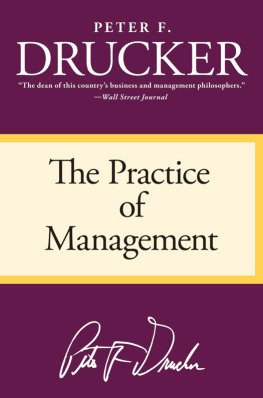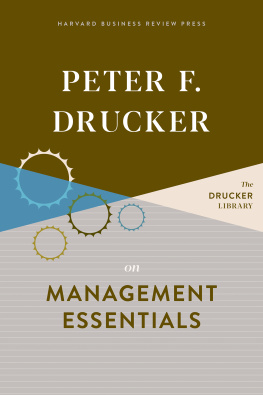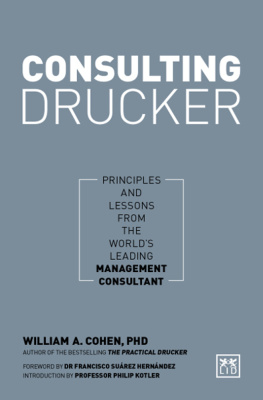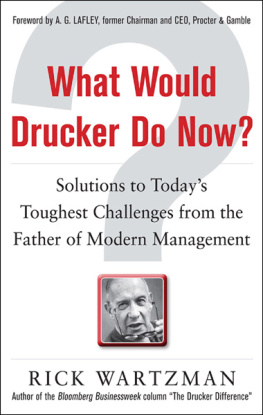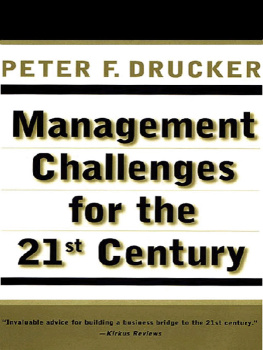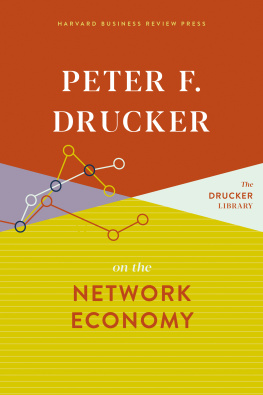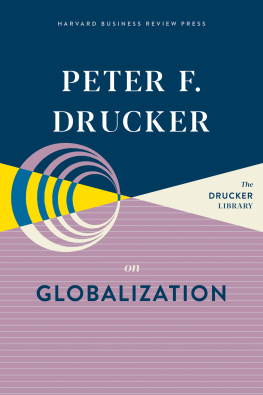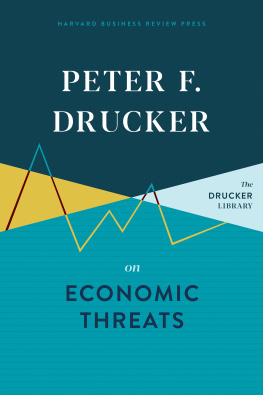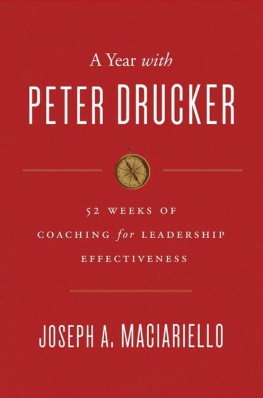Lafley Alan G. - What would Drucker do now : solutions to todays toughest challenges from the father of modern management
Here you can read online Lafley Alan G. - What would Drucker do now : solutions to todays toughest challenges from the father of modern management full text of the book (entire story) in english for free. Download pdf and epub, get meaning, cover and reviews about this ebook. City: New York, year: 2012, publisher: McGraw-Hill Education, genre: Romance novel. Description of the work, (preface) as well as reviews are available. Best literature library LitArk.com created for fans of good reading and offers a wide selection of genres:
Romance novel
Science fiction
Adventure
Detective
Science
History
Home and family
Prose
Art
Politics
Computer
Non-fiction
Religion
Business
Children
Humor
Choose a favorite category and find really read worthwhile books. Enjoy immersion in the world of imagination, feel the emotions of the characters or learn something new for yourself, make an fascinating discovery.

- Book:What would Drucker do now : solutions to todays toughest challenges from the father of modern management
- Author:
- Publisher:McGraw-Hill Education
- Genre:
- Year:2012
- City:New York
- Rating:4 / 5
- Favourites:Add to favourites
- Your mark:
What would Drucker do now : solutions to todays toughest challenges from the father of modern management: summary, description and annotation
We offer to read an annotation, description, summary or preface (depends on what the author of the book "What would Drucker do now : solutions to todays toughest challenges from the father of modern management" wrote himself). If you haven't found the necessary information about the book — write in the comments, we will try to find it.
An in-depth look at todays most pressing business issues through the eyes of Peter Druckerthe father of modern management
Channeling Peter Drucker to tackle some of this centurys most difficult topics, What Would Drucker Do Now? is a veritable treasure trove of fascinating reading. Druckers insights were nothing short of remarkable, and Rick Wartzman pays high tribute to that fact while adding a few of his own.
Marshall Goldsmith, author of the New York Times bestsellers MOJO And What Got You Here Wont Get You There
Rick Wartzman has accomplished what I didnt think was possible: a tapestry of ideas drawn from Wartzmans observations and personal experiences, woven together with the wisdom of the most important management thinker of this or any other age.
Warren Bennis, Distinguished Professor of Management, the University of Southern California, and author of the recently published Still Surprised: A Memoir of a Life in Leadership
Peter Druckers thinking has had an enduring impact on consumer-driven companies like Macys. . . . [What Would Drucker Do Now?] serves as a compendium of the very best ideas that can help all of our companies win in a highly competitive marketplace for products, services, and customer experiences.
Terry Lundgren, Chairman, President, and CEO, Macys Inc.
This collection of essays . . . will broaden you as a manager, a leader, and as a human being. . . . Rick Wartzman has done the world a great service by collecting the most incisive observations of a beautiful mind and linking them to problems that face leaders and organizations everywhere.
Brian Walker, President and CEO, Herman Miller, Inc.
If Peter Drucker is the master, Rick Wartzman is the prized pupil. Drucker would be delighted to see his theories applied in such a cogent, thoughtful fashion.
Jim Weddle, Managing Partner, Edward Jones, and consulting client of Peter Drucker
About the Book:
As technology, globalization, and business innovation advance at breakneck speed, the question What would Drucker do now? becomes more relevant by the day. More than anyone of his time, Peter Drucker understood how the individual, the organization, and society are interrelated. And no one better recognized and articulated the challenges facing all threeor came up with more practical solutions to those challenges.
Since 2007, the Drucker Institutes executive director, Rick Wartzman, has been asking what Drucker would do on a regular basis in his popular online column for Bloomberg Businessweek. In each piece, Wartzman introduces a current issue and provides a view of it through the eyes of Peter Drucker, based on his deep knowledge of Druckers ideas and ideals.
What Would Drucker Do Now? culls Wartzmans best, most timely columns into a single volume, offering a perspective on business and society you wont find anywhere else. Featuring more than 80 articles, the book is organized into seven thematic sections:
- Management as a Discipline
- The Practice of Management
- Management Challenges for the Twenty-First Century
- On Wall Street and Finance
- On Values and Responsibility
- The Public and Social Sectors
- Art, Music, and Sports
Covering everything from the federal bailout of GM and the scandal at Goldman Sachs to the roles religion and race relations play in a well-functioning society, What Would Drucker Do Now? explores a range of subjects as broad as Druckers remarkable mind. Wartzman provides a smart, original, and provocative look at a world being buffeted by change and in which all organizationsprivate, public, and nonprofitare searching for answers. What would Drucker do now, indeed?
Lafley Alan G.: author's other books
Who wrote What would Drucker do now : solutions to todays toughest challenges from the father of modern management? Find out the surname, the name of the author of the book and a list of all author's works by series.

